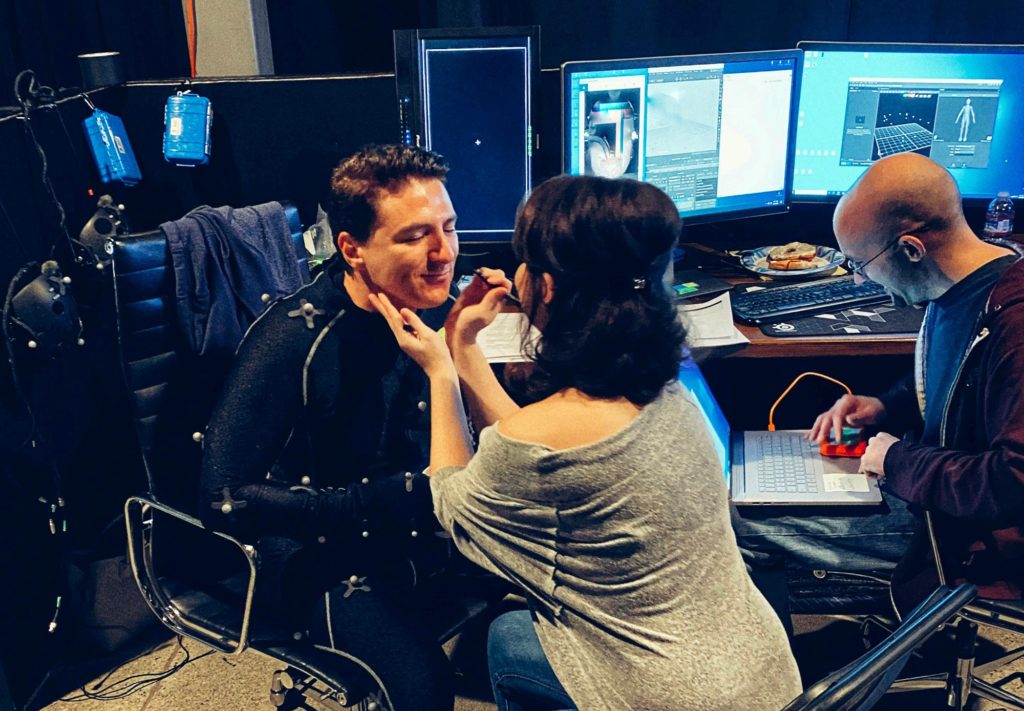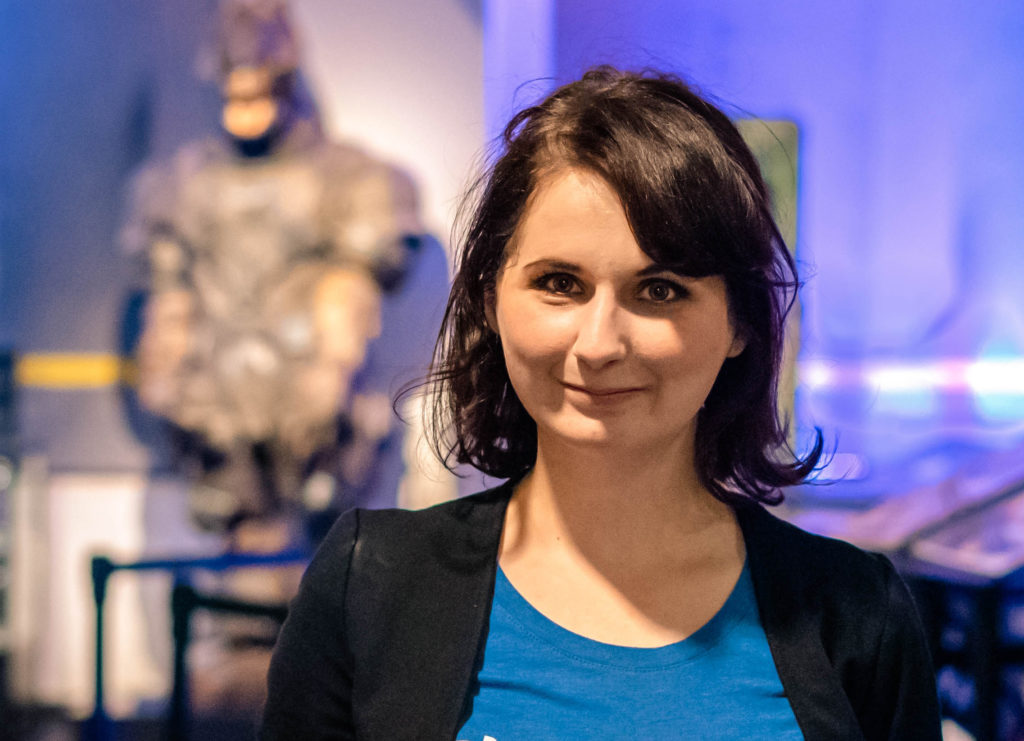
In 2012, as a junior in college, Angel Wylie was so good at League of Legends that she and her teammates reached the finals of an intercollegiate esports tournament. She also happened to be the event’s only female player. Right before the final game, a guy on the opposing team walked up to her and said, “Girls don’t play games.”
“Those were his exacts words,” Wylie, 29, recalls. “And he asked why I was there. I didn’t respond. I ended up just playing the game and kicking his ass. I demolished him. I am so proud of that moment. My brother taught me everything I know about games, and he was definitely looking over my shoulder.”
Since that day, the 2012–13 ESA Foundation Scholar has accomplished much more in what was once a male-dominated community. She graduated from California State University-Chico with a bachelor’s in applied computer graphics, worked for several indie game companies and, in 2017, landed at the triple-A 343 Industries, maker of the Halo series, where she’s crafted a niche as technical motion-capture, or mocap, animator.
“I supervise the shoots and mark-up the talent, the actors playing the characters,” she explains. “We use, basically, these ping-pong balls to capture their body movements and a face cam to capture their emotions. After the shoot, we apply that data to a character rig for the game. As for the technical part, I develop tools for animators to support them in their day-to-days.”
Wylie attributes her success, in part, to the ESA Foundation scholarship, which, she says, “helped me stay at CSU and take an advanced elective in animation with a professor who’d worked on popular films. That’s when I said, ‘Hey, I want to work in animation.’”
But Wylie’s biggest motivation was her brother, Robbie, who, even before she entered college, was taken from her. “He passed away after a motorcycle accident,” she says, “and I always wanted to make both of our dreams come true.”
“My brother and I played Super Nintendo, Mario Bros. — anything where we could hand off the control to one another. Or I’d just sit there and watch him play.”

Born in 1990, Wylie grew up in Folsom, California, where, at age 12, she was inspired by Pixar and DreamWorks films to begin drawing — first with pencil and paper, then, after Robbie introduced her to Photoshop, via digital painting. Her brother, then 17, was also a big fan of video games.
“We used to play Zelda a lot,” Wylie recalls. “Resident Evil 2 was another big one. We played Super Nintendo, Mario Bros. — anything where we could hand off the control to one another. Or I’d just sit there and watch him play.”
Robbie, at the time, was the only one interested in video games as a career, as both a programmer and tester. “He was a character,” Wylie recalls with a chuckle. “He wanted to go into real estate and make lots of money so he could play video games all day. So when he was 21, he was getting his real estate license and programming games on the side.”
One day, while on his motorcycle, Robbie crashed into a car that suddenly turned in front of him. He died on an operating table four hours later. Wylie, then 16, was devastated. And as high school graduation approached, she was determined to fuse Robbie’s goal with her interest in the arts. So, in community college, she took courses geared toward video game design, which became her minor at CSU-Chico.
Even though her mother, Marchell, did everything possible to support Wylie, she still needed financial aid. After Googling “female,” “games” and “scholarship,” Wylie found the ESA Foundation. “I was thrilled,” she says of winning the scholarship. “I was able to not stress about money for one full year and take the time to really hone my skill set.”
What followed, after graduation, was a series of animation jobs at indie companies, among them Telltale Games, which specializes in turning TV series and graphic novels into adventure games. But by the time Wylie arrived there, she’d re-thought her career.
“I realized, working at studios, that other animators were coming to me to solve their problems, whether it was technical or rigging or coding,” she recalls. “So I learned how to develop tools and stomp out fires. And I was like, ‘Is there a job out there that does both — the animation and technical aspect?’”
As “technical animator” at Telltale, she handled everything from debugging to supervising mocap shoots. In late 2017, when 343 Industries, the Xbox Game Studios affiliate, was looking for someone to cover the same ground, she was ready — if a bit intimidated.
“Everyone there is so talented and smart,” she says. “But two engineers took me under their wing and started teaching me more advanced coding. I’m grateful for that. They helped me improve so much.”
After just six months, in fact, Wylie developed a propriety tool that enabled the company’s animation departments, which had previously developed scenes individually, to use the same pipeline with the click of a button. “It was a way for everyone to use just one tool, have one code base, of being able to debug easily,” she explains. “And they all added their own ideas. It was exciting to create that.”
Since starting at 343, Wylie and the 700 other employees at the studio have been working on one game, Halo Infinite, which is due out later this year. She’s also been playing test versions of it almost daily. “We have training sessions, play-throughs,” she says. “It’s amazing.”
She uses the same word to describe 343, which, she adds, “hires for a diverse talent pool.” Every year, a photo of female employees is taken for International Women’s Day, “and the group just gets bigger and bigger,” Wylie says. Plus, many of those in charge, including Bonnie Ross, a Microsoft corporate VP and head of 343, are women. “It’s exciting to see these powerful women in leadership roles,” she says.
Xbox also sponsors Women in Gaming, an initiative focused on promoting and expanding women’s involvement in the industry. “I go to their events,” Wylie says, “and just meeting women from different studios and hearing their experiences inspires me.” It also enables her to pay it forward. “A lot of women will reach out to me and say, ‘Hey, I’ve never done motion-capture’ or ‘How hard is it to learn coding?’ Being able to share what I know is exciting.”
Just as exciting is hosting 343’s charity partner the Make-a-Wish Foundation, which enables critically-ill children to experience unique opportunities. In Wylie’s case, the kids and their families get to attend mocap shoots, where they don the “ping-pong” suits and perform as their favorite Halo characters, including Master Chief, Cortana and Brute.
“They dance around and watch themselves live,” Wylie says. “And their faces just light up.” Some kids might even show up in Halo Infinite. “We try to put their data within the game,” Wylie explains. “So their voice or facial structure or body data might show up as a secondary character.”
Wylie acknowledges she’s landed a dream job — and credits her mother for being “my biggest cheerleader.” But she’s set many more goals for herself, including a podcast for women in video games and, eventually, a professorship. With that in mind, she’ll start studying this fall for a master’s degree in human-centered design and engineering.
Meanwhile, she has advice for those who, like her, once only dreamed of working at a triple-A studio.
“Networking,” she says. “I know a lot of people have social anxiety, including myself, but being able to override that and meet new people has helped me land a job everywhere in my field.”
“And keep learning,” she adds. “When I shifted into the technical field, I taught myself - YouTube videos, reaching out to people. It can be nerve-wracking: ‘What if they never respond, or say no?’ But most people are excited to teach others.”
Which brings her back to Robbie. The day Wylie got the job with 343, he was the first person she thought of. “And I literally went to his gravesite and spent the entire afternoon with him,” she says. “I know that sounds incredibly silly, but I just talked with him and told him, ‘We did it.’”
Rich Shea is a freelance writer living in Washington, D.C.